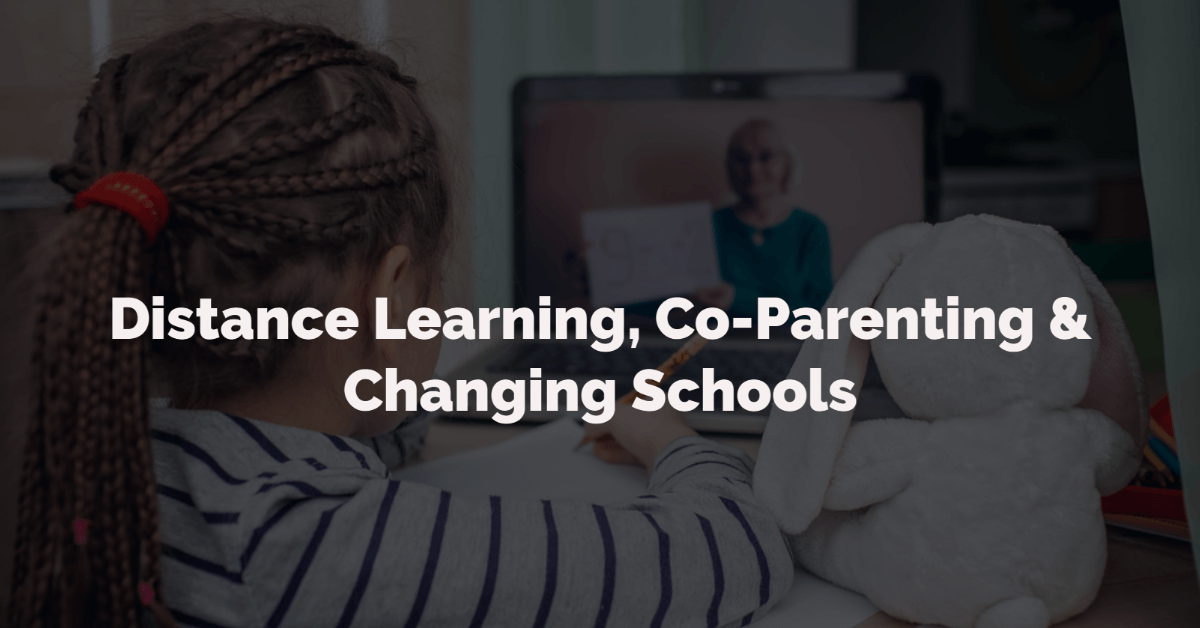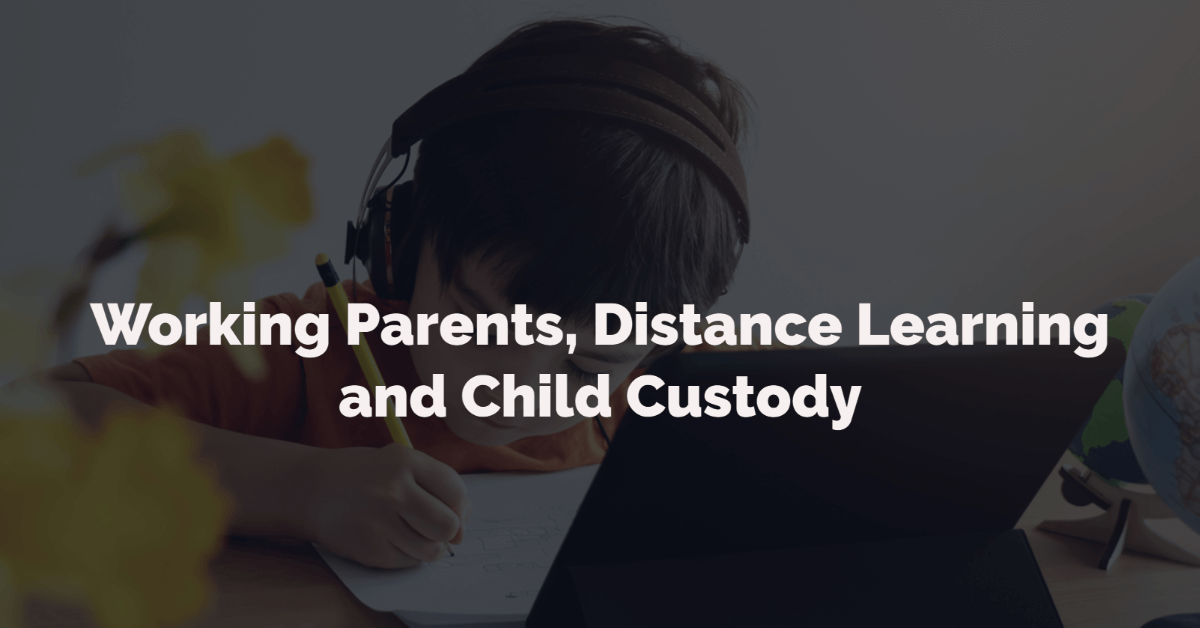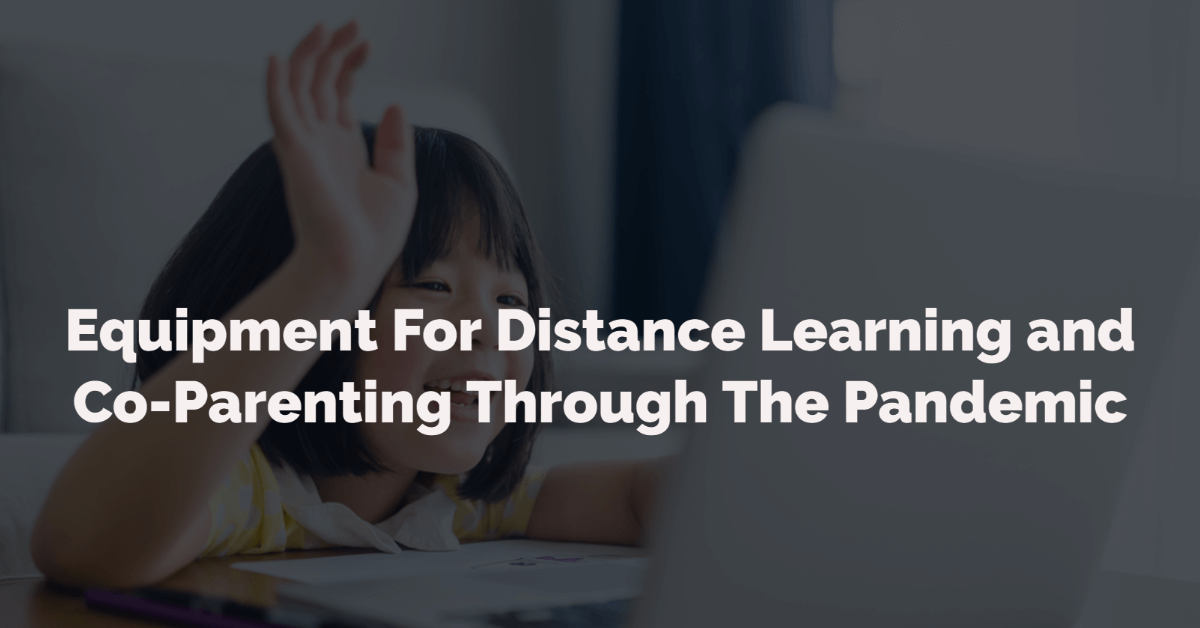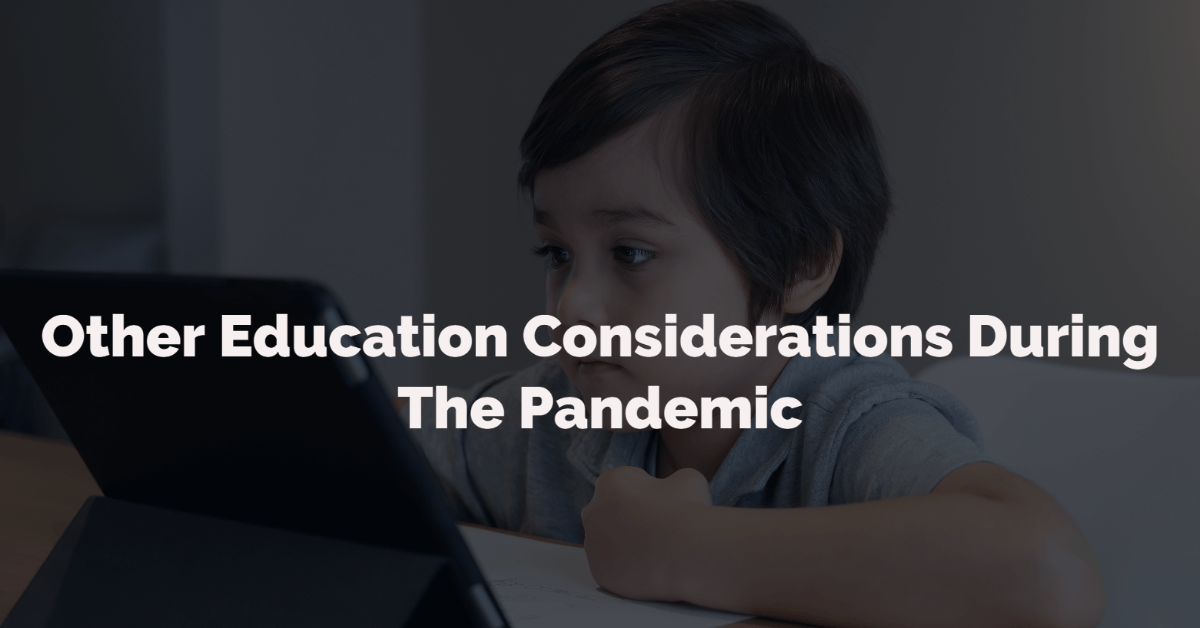The Ultimate Guide to Distance Learning & Co-Parenting During the Pandemic
Remote learning strategies have replaced physical classrooms as our youth continue school. All Clark County School District schools in Las Vegas, Nevada, and many districts around the Country have embraced distance learning with virtual classrooms starting in August 2020.
For many single parents, the school district’s decision to switch to remote learning strategies is a source of stress and anxiety.
Parents are asking questions like:
- What if my ex and I disagree about distance learning? Who gets to decide where our child will attend school? Can I change schools without my ex’s agreement?
- What if I have to work and can’t be home with my child during school hours? Will I lose custody if I can’t help my child do distance learning?
- My ex does not have the means or time to help our child with distance learning. Can we switch the visitation schedule so I can make sure my child’s assignments are complete?
- What if my ex and I disagree over things like daycare providers and extracurricular activities during the pandemic? Who gets to decide?
In this guide, we answer your questions about distance learning for divorced and single parents during the pandemic.
Distance Learning, Co-Parenting & Changing Schools

The decision to make all Las Vegas schools distance learning schools has many parents searching for different options. They may enroll their child in a private school or homeschool or look for an alternative with a physical classroom.
If you are divorced with children, or you have a custody agreement with your ex, the decision to change your child’s school may not be your choice alone.
Thinking about putting your child in a different school, homeschooling, microschooling, or some other remote learning strategies? Consider these steps:
The first step is to review your Divorce Decree or Parenting Plan.
If your decree/plan does not designate who will make school decisions for your child, you cannot change your child’s school without the other parent’s agreement.
Yeah, we know this sucks, but unfortunately, this is the law.
Likewise, if your decree/plan says that you and your ex share joint legal custody, you cannot change your child’s school without the other parent’s agreement.
If your parenting plan says that you have the authority to change your child’s school, make the change. Keep in mind that you must notify your ex of the change in schools.
If you can’t change the school by yourself, what’s next?
The next step is to talk to your ex. Explain to your ex why you want to change your child’s school. See if you and your ex can agree to switch schools for the upcoming school year.
If you can reach an agreement with your ex to change schools, you might want to get it in writing and get a Court order (known as a stipulation and order). You should consider having a custody lawyer write up the agreement to ensure it is accurate and leaves no room for someone to change their mind later.
If you and your ex can’t reach an agreement, you might want to try mediating the issue. You can do this through the Family Court Mediation Center or with a private mediator.
To obtain a Family Mediation Center referral, you will need to submit a request to your family court judge. It usually takes a few days for the judge to review the application and approve it.
Once you have approval, contact the Family Mediation Center to set up your appointment. You will want to let them know that you are mediating school issues. You should be prepared to discuss why the schooling option you want is in your child’s best interest.
If you and your ex can reach an agreement in family mediation, usually, the Family Mediation Center will write up the deal and have you and your ex sign it and then submit it to your family court judge for review and approval. After the judge approves the agreement, it gets filed with the Court as a court order.
Alternatively, if you choose a private mediator, you will want to be sure the mediator knows the issue is school choice. Again, you will need to be prepared to explain to the mediator why changing to your school is the best option for your child. If you reach an agreement, the mediator might write an agreement for you and your ex to sign. However, it will be your responsibility to make sure that the deal gets filed with the Court.
Finally, if talking to your ex and mediation don’t work, you will need to file a motion with the Court. Usually, this means hiring a family law attorney to write your paperwork, attend a motion hearing, and possibly conduct a trial on the issue.
Should you decide that a motion is the only way to resolve changing your child’s school, prepare to offer evidence on the following points:
- Explain to the judge what your child wants assuming your child is of sufficient age and maturity to give a preference;
- Talk about your child’s educational needs and whether distance learning versus changing schools can meet those needs. For example, if your child is in all AP classes through distance education, but changing schools will mean no AP classes, chances are the Court will not approve the change.
- A key factor is comparing the distance learning methods of teaching to the proposed alternative school’s methods of teaching. Will the new school offer in-person classes? If so, you need to explain why this is better for your child?
- You need to show the judge how your child performed in school before and how this could predict your child’s success at a new school.
- Be prepared to discuss any medical, emotional, or other needs your child has and how changing schools will meet them.
- If your child was heavily involved in extracurricular activities, and the new school is continuing those activities, you will need to point that out to the judge.
- If changing your child’s school would disrupt their education, you need to address this point.
- You will also need to explain the commute time to a new school if it is in-person.
- Finally, you will need to address whether putting your child in a different school will alienate the other parent.
While the above list is not exhaustive, it offers some pretty good guidance.
Not sure about whether asking for a school change is worth it? We’d suggest having a consultation with a family law attorney to see what your options are.
Working Parents, Distance Learning and Child Custody

Since the school district announced its decision to go to distance learning, we have received calls from panicked parents asking if they will lose custody if they have to work.
The short answer is that the Court cannot punish a parent simply because they have a job. Just because you have to work during regular school hours, does not mean you should lose custody.
The pandemic requires that parents try to cooperate for the best interests of their children, meaning you might have to change your days with your child or utilize the other parent to assist.
First, we suggest that you speak with your co-parent. Explain your work hours and your concerns that you cannot stay at home with your child to assist with distance learning.
Second, suggest to your ex that you change your regular visitation schedule to allow you to have the child on your days off. Doing this will maximize your custodial time and ensure your child is not falling behind in schoolwork.
If you can agree on a new schedule, we suggest that you get it in writing. Both parents should sign it and submit it to the judge for review and approval.
Third, if you don’t want to change your regular schedule, you might ask your ex to help you during school time while you work. You will need to be clear with your ex that this extra time will not be used against you at a later date to change custody. Again, you will want to get any new agreements in writing and file them with the Court.
Fourth, if your ex is unwilling to help, you should consider looking for childcare during your custodial time. This could be a significant other, a neighbor, a babysitter, or a friend who can assist with distance learning while you are at work.
If you choose this route, you should notify your ex, in writing, of the name, address, and telephone number of the caregiver. Make sure your caregiver has the contact information for your ex in the event of an emergency.
Finally, if you and your ex cannot agree, you should consider filing a motion with the Court asking to modify your regular visitation schedule.
Equipment For Remote Learning Strategies and Co-Parenting Through The Pandemic

It is worth repeating.
Now, more than ever, co-parents need to work together to ensure their child’s educational needs get met.
This means making sure your child has the equipment needed to distance learn effectively.
For example, if your child needs a Chromebook for distance learning, it is your responsibility to make sure that the Chromebook travels with your child during regular visitation. A judge will not take it kindly if one parent is withholding the Chromebook from the other.
Likewise, if your child needs access to a reliable internet connection for remote teaching and your ex doesn’t have one, the family court will expect you both to work together to ensure your child’s schoolwork is done. The judge won’t be happy and may become angry if you ask to change custody because of bad internet access.
Finally, if you need to change your custody schedule to make sure your child has the necessary equipment to adequately distance learn, you and your ex should do so. If necessary, you may need to return to Court to ask the judge to change the schedule to meet your child’s educational needs.
Considerations For Remote Learning Strategies During The Pandemic

We get it. School is not the only thing that is in flux due to the pandemic.
Many children who participate in extracurricular activities are seeing changes in the 2020 school year.
Once again, we must stress talking to your co-parent about extracurricular activities.
If your child is a football player, their season will likely not start until December or even next Spring. You might be considering an alternative sport or having your child do weightlifting at a gym until football season starts.
If this might be a point of contention with your ex, we suggest that you and your ex discuss the extracurricular activity. Talk about alternatives to ensure your child remains competitive, but consider the risk to your child. If you and your ex cannot agree, you might need to get the Court involved.
Likewise, your ex may not be super excited to have your child around strangers during the pandemic. If you plan to have a daycare provider or tutor, share this information with your ex. If your ex still doesn’t agree, you may need to file a motion with the Court.
Final Words
We will reiterate once more that these are unprecedented times. Parents need to work together and cooperate for the best interests of their children.
However, we understand that it is not always possible to get along with your ex. If that is the case and you need assistance navigating distance learning, co-parenting, and child custody, we can help. Call us today or click the banner below to fill out our online form for more information and receive 50% off your consultation.
Further Reading
For those navigating the complexities of family law, our lead attorney, Molly Rosenblum Allen, Esq., has meticulously crafted a suite of resources to support you during your time of need. Below is a list of valuable resources that can provide in-depth information and guidance:
Las Vegas Custody Attorney: Understand your rights and options in child custody cases. Learn more.
Fathers Rights: Discover how to navigate the legal landscape as a father seeking custody or visitation rights. Explore your rights.
Supervised Visitation: Gain insights into how supervised visitation works and what you need to know. Read more.
Changing Custody Agreement: Find out the steps necessary to modify a custody agreement in Nevada. Get the facts.
Grandparents Rights Nevada: Learn about the visitation and custody rights of grandparents in Nevada. Understand your rights.
Long Distance Co-Parenting: Tips and strategies for effective co-parenting across distances. Discover how to manage.
How a Mother Can Lose a Custody Battle: Important information for mothers on the pitfalls to avoid in custody disputes. Read the guide.
Custody Battle Tips for Nevadans: Strategic advice for those involved in a custody battle within Nevada. Learn winning strategies.
What Not To Say In Child Custody Mediation: Guidance on what to avoid saying during mediation to better your chances. Know what to avoid.
How Much is a Custody Lawyer: Get an idea of the costs associated with hiring a custody lawyer in Las Vegas. Understand the costs.
Types of Custody: Clarify the different custody arrangements available and which might suit your situation best. Compare types of custody.
At What Age Can a Child Decide to Stop Visitation: Find out at what age a child’s preferences are considered regarding visitation. Learn more.
Each resource is designed to provide you with clarity and empowerment as you navigate the legal challenges surrounding family law in Las Vegas. Remember, the information provided in these resources is not a substitute for legal advice but can serve as a helpful starting point in understanding your situation and preparing for the road ahead.

Frequently Asked Questions
What if my ex and I disagree about distance learning?
Learn how to handle disagreements about distance learning with your ex and understand your legal rights, ensuring that your child’s education remains a priority and conflicts are resolved amicably.
Who gets to decide where our child will attend school?
Discover the factors that determine who has the authority to make school decisions for your child in a co-parenting situation, providing clarity and guidance for navigating this important aspect of your child’s life.
Can I change schools without my ex’s agreement?
Find out the steps you need to take if you want to change your child’s school and your ex doesn’t agree, empowering you to take action while respecting legal and co-parenting considerations.
What if I have work conflicts during school hours?
Explore solutions for managing work schedules that conflict with childcare responsibilities during distance learning, ensuring that you can fulfill your work obligations while prioritizing your child’s education.
Will I lose custody if I can’t help my child with distance learning?
Understand how working parents can navigate custody concerns related to their inability to assist with distance learning during work hours, providing reassurance and clarity in a challenging situation.
How can I ensure my child’s assignments are complete if my ex can’t help?
Learn strategies for adjusting visitation schedules and coordinating with your ex to ensure your child’s educational needs are met, fostering collaboration and accountability between co-parents.
Who decides on daycare providers and extracurricular activities during the pandemic?
Understand how decisions regarding daycare providers and extracurricular activities are made in co-parenting situations during the pandemic, ensuring that your child’s well-being and development are considered.
What if my ex and I can’t agree on these matters?
Explore options for resolving disagreements with your ex, including mediation and legal recourse, to ensure your child’s well-being and maintain a positive co-parenting relationship.
How can I navigate the complexities of co-parenting and custody during the pandemic?
Find guidance on managing co-parenting challenges amidst the unique circumstances of the pandemic and access resources for assistance, empowering you to navigate these challenging times with confidence.
What if I need legal advice or assistance with co-parenting issues?
Discover resources and services available to help you navigate legal and practical aspects of co-parenting during the pandemic, providing support and guidance when needed most.

Offsite Resources You May Find Helpful
E-learning Industry: An online community of eLearning professionals which provides articles, resources, and guidelines for effective distance learning.
CoParenter: An app and resource platform designed to help separated, divorced, and never-married parents communicate, manage, and organize their shared parenting responsibilities.
Our Family Wizard: A tool for divorced or separated parents, providing a platform for communication and shared planning.
National Institute of Mental Health: Provides a wealth of resources for dealing with stress and anxiety during the pandemic, which can be especially useful for parents trying to manage co-parenting and distance learning.
Khan Academy: Offers free online courses for students of all ages, which may be useful for parents trying to supplement their children’s distance learning.
Centers for Disease Control and Prevention (CDC): Provides guidelines and resources for managing COVID-19 related issues, including considerations for school and childcare closures.
American Psychological Association (APA): Offers a variety of resources on managing stress and supporting children’s emotional wellbeing during the COVID-19 pandemic.
What Next?
Having family troubles in Las Vegas?
Look no further than The Rosenblum Allen Law Firm!
We understand what you’re going through and can provide the expert legal advice and representation needed for your happiest, healthiest outcome.
Don’t wait any longer – we won’t let you fight alone. Let us help protect your rights with experienced attorneys who know the ins and outs of the court system here in Vegas.
Call (702) 433-2889 now for a free consultation today!
The Reason You Haven't Hired A Child Custody Attorney Yet
We’re ready to fight for the rights of your family if you hire us. We’re waiting to jump into action on the behalf of your family.




